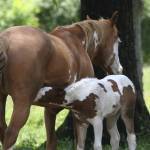Foals: First Meals Vital for Health, Survival

“Mealtime” means different things to different animals: toddlers despise it, chefs drool in anticipation, hibernating animals abuse it prior to winter, and athletes covet carb-rich meals before competing. For foals, their first meal could mean the difference between life and death.
“Foals are born with competent immune systems but lack infection-fighting antibodies that serve as the first line of defense against disease-causing microorganisms. Instead of being born with antibodies, foals obtain them by ingesting their mare’s first milk or colostrum, a process referred to as passive transfer of immunity,” explains Bryan M. Waldridge, D.V.M., head veterinarian for Kentucky Equine Research.
Failure of passive transfer occurs when foals receive either an inadequate quantity or quality of antibodies. Without antibodies, foals are at risk of developing serious infectious caused by any of the dozens of microbes lying in wait in the environment the foal was born into. But how much colostrum is “enough” to keep a foal healthy?
“When in doubt, the best way to answer this question is to measure antibody levels in the foal’s blood,” says Waldridge.
As easy as it sounds, the interpretation of antibody (IgG) levels is subject to debate because according to one study*, cutoff values of IgG to predict either complete or even partial failure of passive transfer that have been in use for 30 years are largely empirical, meaning they’re basically an educated estimate.
To determine whether traditional cutoff IgG values were indeed valid, the research team analyzed data from 597 foals that were 7 days of age or younger and either healthy, sick, or septic (bacteria in the bloodstream).
They found:
- A traditional IgG cutoff value of >8 g/L was a realistic and reliable indicator of adequate transfer of immunity;
- Foals with any degree of failure of passive transfer were more likely to die than those with adequate transfer; and
- As the level of IgG decreased, the chances a foal would die increased proportionally.
“It is reassuring to know that our currently available tests for measuring a foal’s immune status are reliable. We encourage any owner concerned about foal health to contact his veterinarian as soon as possible,” advises Waldridge.
*Lipeman, R.S., K.A. Dembek, N.M. Slovis, et al. 2015. Validation of IgG cut-off values and their associations with survival in neonatal foals. Equine Veterinary Journal. In press.








